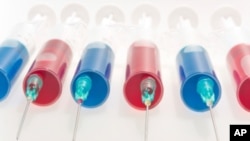Scientists have made a discovery they say could lead to a vaccine to prevent and cure breast cancer, a common and deadly disease that afflicts millions of women around the world.
The experimental vaccine developed by researchers at Cleveland Clinic's Lerner Institute in Ohio was 100 percent effective in preventing breast cancer in a group of mice specially bred to develop the disease. The vaccine, which has been in the works for the past eight years, also stopped the growth of existing tumors.
Breast cancer is the second most common cancer in women worldwide, and there are approximately a half million new cases reported each year. The disease is notoriously hard to cure. It often recurs within 10 years, despite treatments thought to be effective at the time of diagnosis.
Lead researcher Vincent Tuohy says the experimental vaccine works by stimulating the immune system to protect the body against the development of breast cancer. Until now, the major hurdle for researchers working on cancer vaccines has been finding ways to avoid setting off auto-immune responses in cancer patients. Autoimmunity occurs when the body's immune system mistakenly attacks healthy tissue or organ systems.
The resulting inflammation can trigger an even more aggressive form of breast cancer. But vaccine researchers have found a way to target proteins that are only present in breast tumors but not in healthy breast tissue, according to Tuohy.
Tuohy says the vaccine kept the specially-bred, breast cancer-prone lab mice completely tumor-free.
"We found the first way of creating a self-vaccine that can be used prophylactically, in a preventive manner, to protect us against a disease before we get it just like polio and measles," said Vincent Tuohy.
Experts say a woman has a 12 percent risk of being diagnosed with breast cancer over her lifetime. But according to the US National Cancer Institute, women who have inherited two abnormal genes, called BRCA (BROCK-AH) 1 and BRCA (BROCK-AH) 2, have a much higher, 60 percent risk of developing breast cancer by age 90.
Becca Martello was diagnosed with advanced breast cancer at age 39. She underwent surgery, radiation, chemotherapy, and had her uterus removed to prevent the cancer from recurring.
Breast cancer runs in Martello's family and she's thrilled at the prospect of a vaccine to prevent the deadly disease.
"I can't really believe it yet," said Becca Martello. "I'm just so thrilled, [I have] goose bumps; just amazing."
Meanwhile, the researchers at Cleveland Clinic plan to ask US regulators for permission to begin human safety trials of the vaccine within the next year. The breast cancer vaccine would be targeted at women age 40 and older.
Lead researcher Vincent Touhy says the breast cancer vaccine project was inspired by the success childhood immunization programs have had in preventing infectious diseases in young people. But no such medically effective safeguards have been available for people middle-aged and older:
"And yet they confront these horrific diseases like breast cancer and prostate cancer and colon cancer and so forth and I thought this is the giant hole." he said. "We don't have a similar preventive vaccine program for adult diseases."
Tuohy and his colleagues describe their research in an article this week in the journal Nature Medicine.
Researchers Develop Promising Breast Cancer Vaccine













